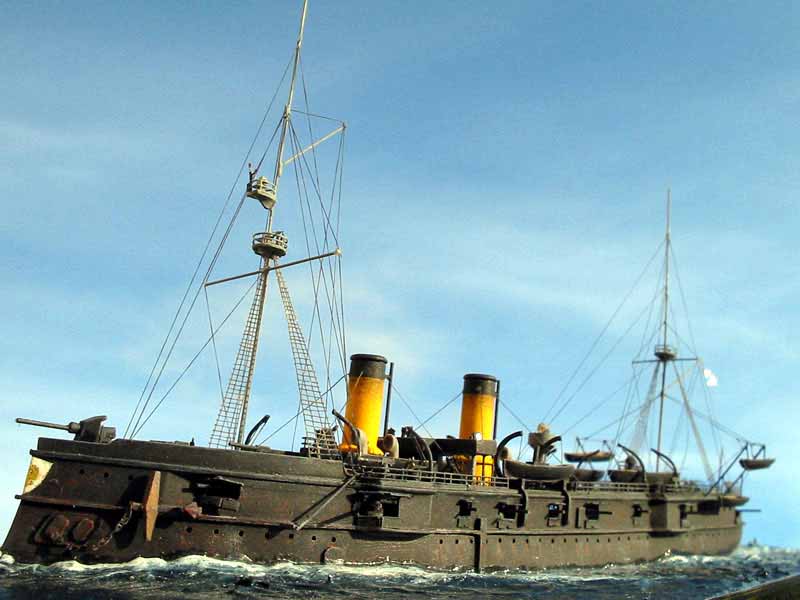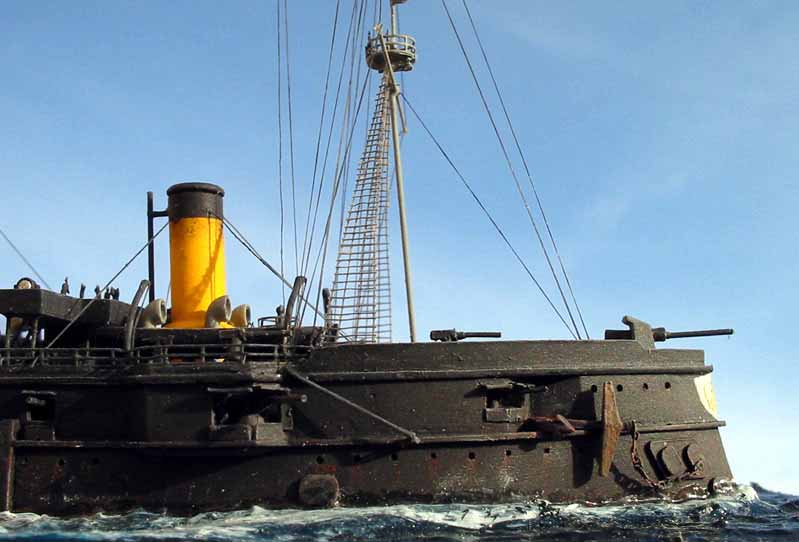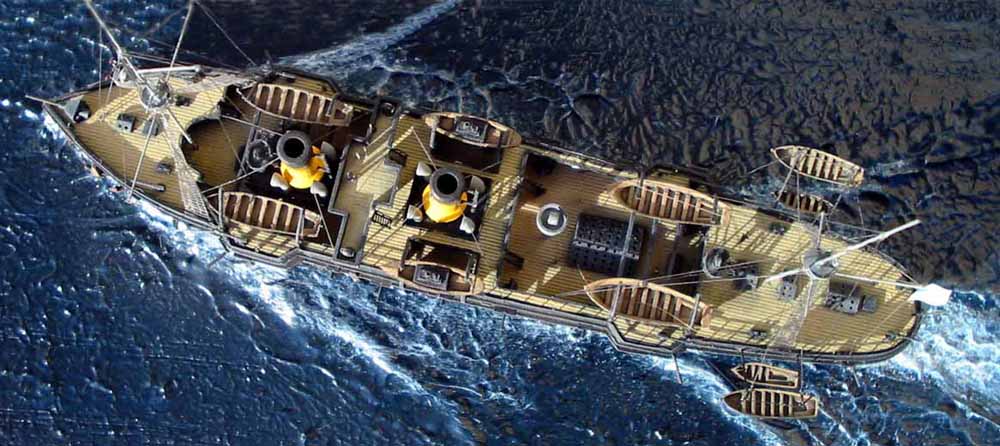| The 1/700 scale kit of Vladimir Monomakh
comes from a Russian company Kombrig. The kit consists of 93 resin
parts. Parts are exquisitely molded, with sharp castings and no air
bubbles. The ship reflects Vladimir Monomakh as she appeared at Tsushima
in 1905. |
|
|
| Hull
The hull is excellently cast and as customary with other Kombrig kits
there was no pour plug. Due to the interesting layout of the ship
the upper deck is molded separately on a very thin carrier of resin, which
was very easy to clean up. For some reason Kombrig still does the
Aztec ladder instead of leaving them to be replaced with photo etch, so
they need to be carefully cut off from the hull. When the hull was
unpainted some irregularities were seen in her main deck, but they disappeared
after paining. Due to the interesting layout of the ship I
decided to open the gunports. The gunports are molded shut, but I
judged that it will be easier to align all of the guns with them opened
than to try to drill the holes for them and align them through the holes.
Besides they look much more interesting this way (due to the top deck being
separate Iíve opened up the gunports in the solid part of the hull
as well and since the aft 4.7Ē guns were placed in the captains saloon
Iíve opened up that whole area and in the fit of insanity scratchbuilt
a table and some chairs J). Iíve built the gunport covers from the
0.05 styrene sheet, through since then I found other material that works
even better Ė photo paper from Alps printer. |
click images
to enlarge
|
 |
 |
 |
|
|
| Painting
According to the text in my references, the middle mast was hacked off
just before leaving for Tsushima, so the correct paint scheme in this configuration
would be black with yellow funnels. If you want to do a white color
scheme you will have to add the middle mast. I painted the hull with
Model Master (MM) acrylic black diluted with white, so that it doesnít
look like a black hole. Deck was painted with a custom mixed color.
After painting I went over the deck with the stuff called ďBlack-It-OutĒ,
which is water soluble black wash. It showed off the deck planking
and other deck details. I cleaned up the excess with Q-tips after
it dried. I dry brushed the deck with a lighter shade of tan to bring
out the details and smooth over the wash. The black funnel tops were
made from decals so that they were even and straight. |
|
|
 |
|
|
| Guns
A word of caution, since the top deck covers portion of the gun deck,
the guns on the main deck need to be installed before gluing on the top
deck. Iíve replaced all of the barrels on the 6Ē and 4.7Ē guns with
hypodermic tubing. One of the drawbacks of the kit is that all of
the guns provided are the same 6Ē guns, while the ship carried four 6Ē
and four 4.7Ē guns on her gun deck. Since 4.7Ē guns were noticeably
smaller Iíve scratchbuilt them. There were sixteen 47mm guns on the
real ship, but only twelve are provided by Kombrig, so I got four more
from my spares box. The 47mm guns in the kit come with gun shields,
but according to my references the guns on Monomakh didnít have them, so
I removed them prior to installation. Six 37mm guns came from WEM
PE set for the Russian Cruiser Askold.
Masts and Rigging
Iíve scratchbuilt the masts from brass rod; through Iíve used the too
thin rod. It was very hard not to over tighten the them and tilt
the mast and I actually had forward mast collapse under tension from the
rigging (at least I assume that that was the cause since everyone in the
house swears on their life that they didnít touch it J). The rigging
and ratlines were made from stretched pantyhose. Ratlines were made
on a jig. I cut out a square in a piece of styrene then glued the
vertical lines to it and then glued the horizontal lines to the sides of
the jig, not to the vertical lines. Once everything was dry a carefully
glued the vertical and horizontal lines to each other (being careful to
dab any excess superglue right away with a finger). Once they were
dry I cut them out as I would from the PE and glued them to the ship tightening
later with a match. Since then Iíve found a much less labor intensive
alternative from Sami Arim, who makes PE Ratlines for 1/1250 scale ships,
but which can also be easily used in 1/700 scale (Navalis Models - http://navalismodels.com/).
The fighting tops were a mystery as there are drawings of the ship
both with them and without them, but as there are no photos of her (that
Iíve been able to find) during her voyage to Tsushima I decided to go with
Kombrig drawings, which had them. There should be splinter shielding
around them, not railings, but it was too hard to do, so I went with railings.
Iíve also scratchbuilt the forward and aft searchlight platforms.
Forward platform on the fore mast wasnít present at all and aft on the
deck was cast as a single block, while my references showed it to be standing
on four posts. |
 |
| Boats and Anchors
To complete her boat load out Iíve used two of WEMís Russian 36í pinnaces.
While the kit had boat davits, I didnít like them and scratchbuilt my own
from brass rod. The boat skids over the main deck were not
provided, so I used square styrene strips to make them. The smoke
stacks on the steam launches were made from hypodermic tubing. The
ship had 4 anchors, but only two were provided in the kit and I didnít
feel like scratch building the other two so I just went with two.
The anchor chain was made from the WEM PE chain (assembled link by link).
The Imperial Eagle on the bow and the shield it is on, were printed on
Alps printer. After everything was complete I sprayed the whole ship
with MM Dullcote to get rid of any glue marks. |
 |
| Base
The water was made using Liquitex Acrylic Gel Medium (available at Arts
and Crafts stores). Some people prefer to mount their model before
they do the water, but I prefer to do the water first and then to mount
the model as a very last step. To do that, I traced the shape of
the hull of a piece of styrene and placed that cutout on the base and did
water around it. I created the waves and bow wave first with copious
applications of the gel medium and then after spreading a thin coating
of it all around the base I used a stiff brush to do the ripples by stabbing
it at the thin spots. After that, I painted the water blue and dry
brushed with white where appropriate. After gluing the model to the
base, I touched up the joint between the model and the water with Gel Medium. |
|
|
Conclusion

Overall it is an excellent kit. The detail and fit on this kit
is one of the best Iíve ever seen. After suffering AMS with my aircraft
kits, I donít go out of my way to measure the ship kits, so I donít know
how good it is dimension wise, but it certainly looks right. I thoroughly
enjoyed building this kit and I plan to build one more backdating it to
the original layout with sails and full rigging.
Links:
|


